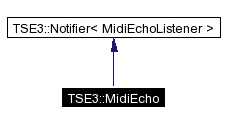
#include <MidiEcho.h>
Inheritance diagram for TSE3::MidiEcho:


Public Member Functions | |
| MidiEcho (MidiScheduler *scheduler) | |
| MidiFilter * | filter () |
| int | channel () const |
| void | setChannel (int c) |
| int | port () const |
| void | setPort (int p) |
| void | echo (MidiEvent command) |
The MidiEcho class provides a software equivalent to the MIDI Thru port found on some MIDI equipment.
MIDI Thru provides an exact copy of the MIDI data recieved at the MIDI In port allowing a number of MIDI devices to be 'daisy-chained' together.
Many MIDI interfaces, however, do not provide a MIDI Thru capability so the MidiEcho class is used to emulate it in software.
The MidiEcho class contains a MidiFilter to provide some software filtering of the incoming/outgoing data. You can disable the MidiEcho functionality by setting the filter's status to false.
The Transport class creates and maintains an object of this class to do good things.
|
|
MidiEcho defaults to being off.
|
|
|
Returns the MIDI filter that effects MIDI echo. You can use this filter to force which channel and port the MIDI echo output appears on.
|
|
|
Returns the channel that MIDI echoing is accepted from. A value of MidiCommand::AllChannels means every channel. Note that this value doesn't set where MIDI echo output is sent to, but from where it is received.
|
|
|
Sets the channel that MIDI echoing is accepted from. Note that this value doesn't set where MIDI echo output is sent to, but from where it is received.
|
|
|
Returns the port that MIDI echoing is accepted from. A value of means every port. Note that this value doesn't set where MIDI echo output is sent to, but from where it is received.
|
|
|
Sets the port that MIDI echoing is accepted from. Note that this value doesn't set where MIDI echo output is sent to, but from where it is received.
|
|
|
Echo the specified command. This method should be called for all recieved MIDI data, as soon as possible after it has been recieved (this is done by the Transport object). Although the input parameter is a MidiEvent, only the 'data' part, a MidiCommand, is used.
|
 1.3.2
1.3.2